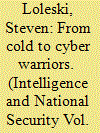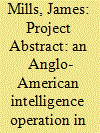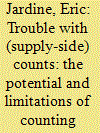|
|
|
Sort Order |
|
|
|
Items / Page
|
|
|
|
|
|
|
| Srl | Item |
| 1 |
ID:
163796


|
|
|
|
|
| Summary/Abstract |
The establishment of the Intelligence and Security Committee (ISC) in 1994 for the first time allowed British parliamentarians access to intelligence agency staff and records. However, as a committee of parliamentarians, but not a parliamentary committee, the ISC was a constitutional anomaly. In 2013, significant reforms reconstituted the ISC as a parliamentary committee, with enhanced powers and an expanded mandate. Drawing on interviews with ISC members and detailed examination of committee business, this article examines the impact of recent reforms. It argues that while reform has had a significant impact on the committee, in a number of respects it remains strongly constrained by government.
|
|
|
|
|
|
|
|
|
|
|
|
|
|
|
|
| 2 |
ID:
163803


|
|
|
|
|
| Summary/Abstract |
How did the National Security Agency (NSA) adopt the practice of
hacking? This paper explores how NSA confronted the digital age by
focusing on arguably NSA’s key organizational innovation as a microcosm of these broader changes: the Office of Tailored Access Operations
(TAO). This paper develops a pragmatist model of organizational change
showing how the practice of hacking became a practical solution to deal
with the problems posed by a globally networked world through TAO’s
case history. TAO’s aggressive expansion by developing a scalable
Computer Network Exploitation (CNE) architecture was designed to
keep NSA relevant in the twenty-first century
|
|
|
|
|
|
|
|
|
|
|
|
|
|
|
|
| 3 |
ID:
163797


|
|
|
|
|
| Summary/Abstract |
The post-9/11 era has seen a proliferation of special, or one-off parliamentary inquiries into intelligence. This article examines the question of what quality such inquiries can achieve, exploring the scandal surrounding the case of the German far-right terrorist group National Socialist Underground (NSU). The article introduces a theoretical framework, with remit, rigor and reception as the key pillars of analysis. While special inquiries are often seen as a way of overcoming imperfections of the traditional accountability system, they can also create a placebo effect – an illusion of accountability which allows intelligence services to go uncontrolled under a blanket of democracy.
|
|
|
|
|
|
|
|
|
|
|
|
|
|
|
|
| 4 |
ID:
163804


|
|
|
|
|
| Summary/Abstract |
In early 1947, American intelligence organisations learned that there were hidden collections of technical documentation that pertained to World War II German guided weapon development that were not recovered by Allied investigators in 1945. A joint Anglo-American intelligence operation was initiated in February of that year, dubbed ‘Project Abstract’ by the Americans, to recover the caches. Project Abstract was a concerted effort by British and American scientific and technical intelligence experts to round up the last material remains of the World War II guided weapon programmes at the renowned experimental and testing establishments at Peenemünde in northern Germany.
|
|
|
|
|
|
|
|
|
|
|
|
|
|
|
|
| 5 |
ID:
163800


|
|
|
|
|
| Summary/Abstract |
This study examines Anglo-American narratives of British and German photographic intelligence (PI) in Europe during the Second World War. According to these narratives, Germany relegated PI to tactical and operational applications; by contrast, Britain performed these same functions but also made strategic use of the discipline. This paper reevaluates how British and German PI actually differed. It further examines whether each side’s successes and failures were within the ‘agency of agencies’ – how much did PI successes and failures directly result from intelligence organizations’ choices and actions? Finally, this paper identifies implications of these narratives for comparative intelligence studies and historiography.
|
|
|
|
|
|
|
|
|
|
|
|
|
|
|
|
| 6 |
ID:
163795


|
|
|
|
|
| Summary/Abstract |
Spies and scholars in the United States have had a close, largely hidden, relationship. Both professions are in the business of information acquisition. Spies, though, work for the government, while the allegiance of most scholars is to independent research and teaching. Moreover, spy organizations view students as potential hires; in contrast, scholars are likely to see students as young charges placed in their hands to educate and prepare for lives of consequence. One school of thought argues that, since spies and scholars are both citizens, they should work together in partnership: sharing knowledge to improve the intelligence product, training and recruiting students, warning of radical activities on campus. A second school counters that the university is meant to be a pure and open place, dedicated to unbiased learning and free of government ties – especially entanglements with secret agencies. Campuses can find themselves torn between the two schools, caught up in a swirl of practical and moral issues that lead to a sense of ambivalence about the proper relationship between the academy and a nation’s secret services.
|
|
|
|
|
|
|
|
|
|
|
|
|
|
|
|
| 7 |
ID:
163801


|
|
|
|
|
| Summary/Abstract |
Many national security threats now originate on the Dark Web. As a result of the anonymity of these networks, researchers and policymakers often use supply-side data (i.e. the number of sites) as a threat metric. However, the utility of these data depends upon the underlying distribution of users. Users could be distributed uniformly, normally or in a power law across Dark Web content. The utility of supply-side counts varies predictably based upon the underlying distribution of users. Yet, the likelihood of each distribution type varies inversely with its utility: uniform distributions are most useful for intelligence purposes but least likely and power law distributions are least useful but occur most commonly. Complementing supply-side counts with demand-side measures can improve Dark Web threat analysis, thereby helping to combat terrorism, criminality and cyberattacks.
|
|
|
|
|
|
|
|
|
|
|
|
|
|
|
|
| 8 |
ID:
163798


|
|
|
|
|
| Summary/Abstract |
This article discusses the role of the discourse of law in legitimizing the protection of intelligence secrets. It draws on examples from the United Kingdom and the United States to illustrate rhetorical regularities with respect to the need to protect intelligence officers, agents, sources and methods, the effectiveness of intelligence agencies, international intelligence relationships and the effects of a mosaic of disclosed information. It concludes that judges produce specialized knowledge on state secrecy that plays a part in shaping the understanding of state secrecy in society.
|
|
|
|
|
|
|
|
|
|
|
|
|
|
|
|
|
|
|
|
|